ASU study finds media consumption predicts how people think about computer hacking

An ASU study found that watching more television and movies affected how people thought about hacking. Media consumption was related to people over-weighting the benefits of hacking while not considering potential punishments. Photo by Markus Spiske, Unsplash.
The American economy lost between $57 and 109 billion in 2016 from cyberattacks, and they remain a serious threat.
Arizona State University’s Virginia Kwan is working to understand motivations behind carrying out cyberattacks. Her lab recently examined the relationship between media consumption and how people think about hacking.
People who watched more television and movies thought that other people would be more likely to engage in hacking. Media consumption was also related to over-weighting the benefits of hacking, to such an extent that the punishments — which include community service, expensive fines and lengthy prison sentences — did not influence how people thought about hacking. The study was published online in Cyberpsychology.
“There are so many hackers in television shows and movies now — from the Girl with the Dragon Tattoo, to Gray’s Anatomy and even South Park — that it is hard to avoid portrayals of hackers in the media. We wanted to understand whether the general prevalence of hackers in the media affected people’s perceptions about willingness to hack,” said Kwan, who is a professor of psychology and senior author on the paper.
The study included 149 participants, who all had college degrees in a natural science or computer science. The research team surveyed the participants about their media consumption and perceptions about hacking. The team compared perceptions of financial hacks in which money is stolen and hactivisim, or hacking for social motivations like protecting the elderly from online scams.
“Media exposure affected perceptions of both financial hacking and hacktivism,” said Samantha McMichael, a psychology graduate student and author on the paper. “People who watched more media reported identifying with hacker characters and thought others would be likely to hack.”
Video by ASU Department of Psychology
The relation between general media consumption — not just television shows and movies with hacking characters — and the perception that other people would be willing to hack was not the only finding that surprised the research team. When forming their perceptions of hacking, the participants did not consider any of the negatives associated with hacking, like possible punishments, only the positives. The punishments for hacking include community service, expensive fines and length prison sentences.
“We expected the risk of getting caught to be a factor in how people perceived hacking, but it had no impact,” Kwan said. “The participants only considered the benefits of hacking when forming their perceptions, which parallels how hackers are commonly glorified in media.”
The findings from the study suggest that the portrayals of hacking in the media are not harmless. Kwan suggested that in the future movies and television shows with hacker characters might require a warning similar to the current ratings for graphic content involving sex or violence.
Sarah Staggs, who recently finished postdoctoral studies at ASU, also contributed to the study.
More Science and technology

Student teams create AI tools to help neurodivergent learners
When Stevie Cervantes was a first-year student at Arizona State University, she shied away from using AI.“AI was everywhere and…

ASU researchers shed light on ancient tattoos in the Nile Valley
Long after an archaeological excavation, discoveries can still be made. One such example of this is newly discovered tattoos from…

ASU’s LEAPS lab marks a decade of energy impact
Nathan Johnson doesn't mince words when it comes to Earth's energy requirements.“The world needs every electron it can get to…